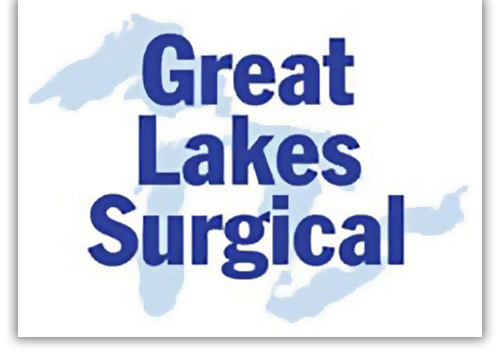Hernias
Hernias can be incredibly painful and even life-threatening in severe cases. The Great Lakes Surgical team can handle a variety of hernia repair procedures in a hospital setting.
What Is a Hernia?
A hernia is a condition in which part of an organ is displaced and protrudes through the wall of the cavity containing it (often involving the intestine at a weak point in the abdominal wall).
The most common hernias are in the abdomen but they can also appear in the upper thigh, belly button, and groin regions. Most hernias are not immediate life threatening but will not disappear on their own and surgical correction will prevent dangerous complications.
Most Common Types of Hernias
Inguinal hernias are the most common type of hernia. These hernias occur when the intestines push through a weak spot or tear in the lower abdominal wall, often into the inguinal canal.
The inguinal canal is found in the groin area of both men and women. In men, it is the area where the spermatic chord passes from the abdomen to the scrotum. This chord holds up the testicles. In women, the inguinal canal contains a ligament that helps to hold the uterus in place.
This type of hernia is more common in men than in women. This is because a man’s testicles descend through the inguinal canal shortly after birth, and the canal is supposed to close almost completely behind them. Sometimes, the canal does not close properly, leaving a weakened spot prone to hernias.
Hiatal Hernias
A hiatal hernia occurs when part of your stomach protrudes up through the diaphragm into the chest. The diaphragm is a sheet of muscle that helps you breathe by contracting, drawing air into the lungs. It separates the organs in your abdomen from those in your chest.
This type of hernia is most common in patients over 50 years old. If a child has the condition, it is typically caused by a congenital (birth) defect. Hiatal hernias almost always cause gastroesophageal reflux (when the stomach contents leak backward into the esophagus, causing a burning sensation).
Umbilical Hernias
Umbilical hernias occur in babies and children under six months of age if their intestines bulge through the abdominal wall near the bellybutton. Parents may notice a bulge in or near their child’s bellybutton, especially when the child is crying.
An umbilical hernia is the only kind that usually goes away on its own, typically by the time the child is one year old. If the hernia has not gone away by this point, surgery may be used to correct it.
Incisional Hernias
Incisional hernias can occur after you have abdominal surgery. Your intestines may push through the incision scar or the surrounding, weakened tissue.
What Causes a Hernia?
Hernias are caused by a combination of muscle weakness and strain. A hernia can develop quickly or over a long period of time, depending on its cause.
Common causes of muscle weakness include:
- failure of the abdominal wall to close properly in the womb (congenital defect)
- age
- chronic coughing
- damage from injury or surgery
Factors that strain your body and may cause a hernia (especially if your muscles are weak) include:
- being pregnant (puts pressure on your abdomen)
- being constipated (causes you to strain when having a bowel movement)
- heavy weight lifting
- fluid in the abdomen (ascites)
- suddenly gaining weight
- persistent coughing or sneezing
What Are the Symptoms of a Hernia?
The most common symptom of a hernia is a bulge or lump in the affected area. In the case of an inguinal hernia, you may notice a lump on either side of your pubic bone where your groin and thigh meet. You’re more likely to feel your hernia through touch when you are standing up.
If your baby has a hernia, you may only be able to feel the bulge when he or she is crying. A bulge is typically the only symptom of an umbilical hernia.
In some cases, hernias have no symptoms. You may not know you have a hernia unless it shows up during a routine physical or a medical exam for an unrelated problem.
Better Health Care is Our Mission
Same Day Appointments are Available.
Phone:
716-434-6141
Fax:
716-434-0594
Email:
GreatLakesSurgery@Yahoo.com
Lockport Address:
160 East Ave.
Lockport, NY 14094
Kenmore Address:
2914 Elmwood Ave.
Kenmore, NY 14217
Appointments in Kenmore Office available by request

